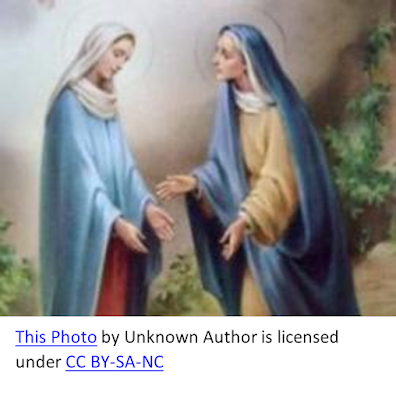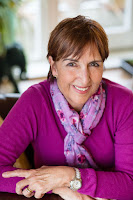Why Did God Choose Mary? by Bobbie Ann Cole
Mary was a poor Jewish girl from a small, inward-looking
community. (Remember, ‘Can anything good come out of Nazareth?’ John 1:46) She
would have been about thirteen when God ‘overshadowed’ her, as the Angel
Gabriel predicted, and she became pregnant with Jesus, the Son of God. Her
young age was no oddity in her day: she was already betrothed to Joseph and the
two were about to marry.
So, why this girl? What made God choose her?
Perhaps the fact that she had nothing special to recommend
her was the point. After all, Isaiah had prophesied that the Messiah would
appear unremarkable: “He had no beauty or majesty to attract us to him,
nothing in his appearance that we should desire him. He was
despised and rejected by mankind,” (Is 53:2-3).
Since such a son could not be expected to emerge from a palace, it is likely that his mother would also be outwardly unremarkable. The only outstanding prophecy about her was that she would be a virgin, (Is.7:14).
RENDERED EXTRAORDINARY
Her
pristine womb would become a second Ark of the Covenant. The Ark, long missing,
had contained the Tablets of the Law, manna that sustained the Children of Israel and the staff of Aaron, the first priest. Mary’s womb bore the priestly founder of the New Covenant who is the Bread of Life. Her virgin womb also foreshadowed the prophesied virgin
tomb in which Jesus would lie at the end of his life (Is. 53:9).
This is
what rendered her extraordinary, rather than something innate in her. There were
many virgins in Israel at the time Mary conceived.
That she
lived and was fertile at that time is relevant, too. God timed Jesus’
ministry at an ideal moment of relative peace during the Roman occupation of
Judea and Israel, when roads were passable and relatively safe and information
could travel far and wide across the broad Roman Empire, enabling early
Christians to spread his message.
GOD'S NEW THING
In
contrast to super fertile young Mary, her elderly and presumed barren cousin, Elizabeth, was pregnant with the Messiah's forerunner, announced by Isaiah (40:3)
and Malachi (4:5-6): John the Baptist. Elizabeth stood at the end of a line of Old Testament women, like Sarah,
Rachel and Hannah who struggled to become pregnant. Each of them eventually became
mothers to significant sons.
LINEAGE
An adoptive father was considered a fully-fledged father and Jesus could legitimately claim Joseph’s lineage as his own.
Joseph’s two gospel genealogies demonstrate that Joseph was of the tribe of Judah, from King
David’s line, from which the Messiah was widely expected to come. Isaiah predicted
that from David’s father Jesse’s “roots a branch will bear fruit,” (Is.11:1). (The
origin of the name Nazareth is thought to be netzer = branch. So that
town, however insignificant, would appear a fitting home for Jesus, the ‘branch’.)
Mary’s
lineage has not come down to us. It is evident she was partly— and perhaps fully—
of the priestly tribe of Levi, since Elizabeth was her relative. Married to the
priest Zechariah, Elizabeth would of necessity have been a purebred Levite (See
priestly marriage rules in Leviticus 21). A prophet, also called Zechariah, had
prophesied centuries before that the throne (Judah) and priesthood
( Levi) would be united in one leader (Zech.6:1-15).
STRONG FAITH
From Mary’s
conversation with Gabriel in Luke 1, we understand that she was full of faith, accepting
what God had for her, despite the potential shame that such a pregnancy could
bring upon her family’s name. In an honour-shame society like that she lived
in, this could even cost her her life. Her trust in God is further underlined by
her warrior-woman-like song, (Luke1:45-55), that follows the great tradition of
women’s songs, like those of Deborah, Hannah and Miriam.
From the
perspective of her profile, geography, era and faith, Mary was a good candidate
to bear God’s son, Jesus.
JOSEPH
But what clinched it for God and made him choose her? Why does He choose any one person for a role? Why did He choose Sarah, the wife of Abraham, to ultimately become the mother of as many offspring as the stars in the sky or grains of sand on the shore (Gen.22:17)? The answer has to be because she was the wife of a man of unwavering faith: Abraham.
So, perhaps
it was Joseph's qualities that made God choose Mary. Joseph was a man ‘faithful
to the law’ (Mat.1:19). God knew the two would bring Jesus up in faith and love of the Scriptures.
THE FOOLISH THINGS TO SHAME THE WISE?
That
doesn’t seem enough, does it? We want more tangible reasons. But, try as we
might to get closer to what made this pair so special, ultimately, we have to
accept that God had His reasons, which we may not always know.
God
chose Mary and Joseph because He chose Mary and Joseph. His thoughts are not
our thoughts, nor are his ways our ways, Isaiah explains. “As the heavens are
higher than the earth, so are (His) ways higher than (our) ways and (His) thoughts than (our) thoughts,” (Is.55:8-9).
Bobbie Ann Cole is a Christian writer, speaker and writing teacher, who is currently writing Mary of Nazareth’s story. Check out her coaching, courses and free groups here.




Interesting blog post. God chose very unlikely women to sit in the genealogy of Jesus. When I think of Leah, Tamar, Rahab, Ruth… each with their own stories that could have disqualified them, why did God choose any of them? I guess God chose the one who was willing, she was young enough to believe in the divine conception, strong enough to accept the fate of ridicule and misjudgement and as we see in her interaction with Jesus at the wedding, she was wise enough to know how to be a mother to Him.
ReplyDeleteSpeaking of genealogy as you mentioned above, many scholars agree that the genealogy in Mathew that traces back to Solomon is Joseph’s and the genealogy in Luke that traces back to Nathan is Mary’s. Nathan was also a son of David from Bathsheba which means that Jesus is truly son of David both by adoption and genealogy. This also means that Bathsheba is the only woman in the Bible with a double claim to Jesus lineage. I cover this in my authors note at the end of my novel Becoming Queen Bathsheba. ,
Thank you for reproducing this comment on the ACW Group FB page where I already responded to it.
DeleteI had never before noticed that the genealogy from David down to Jesus was different in the two gospels. Fascinating! Thank you. Dawn
DeleteLovely post, Bobbie! You ask why Mary? Because God said He would favour whoever He wants to favour! That's my take! Why did God choose you to be wife to your husband or a daughter to your parents? In Mary's case, there must have been so many young worthy virtuous God loving virgins, at the time. The angel told her that she had found favour with God amongst all women! Just like that. Blessings.
ReplyDeleteExactly, Sophia. And you are right that my own story of meeting and marrying my husband was also God-breathed.
DeleteThis opens up the Jewish and Old Testament context very well indeed. I had forgotten that an adoptive father was regarded as a full father. It 's so helpful for us to understand the culture in which the Bible accounts are set.
ReplyDeleteIt's my favourite thing to explore the story world of Bible stories, Sheila. I am glad you found the piece helpful.
DeleteSo interesting Bobbie
ReplyDeleteI'm glad you found it helpful, Ruth.
DeleteTwo other things I didn't mention but that have come up in conversation -
ReplyDelete1. God may have created Mary with His purpose for her in mind, rather than chosen her. She would therefore have been a perfect fit.
2 It is plain from her Magnificat song, exactly the kind of courageous person she was.
As Elizabeth, her relative, recognized: Mary was 'blessed to believe that the Lord would fulfil his promises to her.'
This is very interesting information - it is so lovely to get these glimpses behind the scenes from those who have diligently done their homework. Thank you, Bobbie. Dawn
DeleteThank you, Dawn, for commenting. I am glad you found this interesting and helpful.
Delete